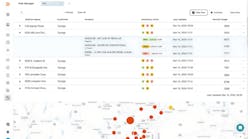Greg Price, president of United Petroleum Transports Inc and former chairman of the National Tank Truck Carriers (NTTC), and John Conley, NTTC president, said this week that the tank truck industry has the capacity to move ethanol as current demand requires.
“Ethanol is becoming a larger and larger segment of our business,” Price said. The comments came at the Platts Refined Products Storage and Transportation conference October 15-16 in Houston, Texas, where biofuel handling dominated the discussions, particularly ethanol.
Price and Conley agreed that the tank truck industry also has the ability to grow in order to meet future demands for ethanol and other alternative fuels. “If there are more advantages to haul a certain product, carriers will make the transition,” Conley said.
However, he pointed out that there are issues within the industry that are impacting transportation efficiency, such as hours-of-service regulations, road and highway congestion, delivery area restrictions, opposition from anti-trucking activists, and driver recruitment and retention.
Conley and Price emphasized the importance of shippers providing drivers with comfortable waiting areas and other means of improving drivers' experiences at the terminals, which can impact driver retention and ultimately help ease driver shortages.
Security regulations
Security regulations are another aspect. The Transportation Workers Identity Card (TWIC) program is one example of bureaucratic demands on the trucking industry. Conley pointed out that the TWIC program requires biometric identification methods, but no reader has been approved for the project. In addition, the tank truck industry wants to know which hazardous materials are considered specific security risks and is working to obtain a list from regulators.
At the same time, Conley and Price noted the need for terminal efficiency to ease drivers' responsibilities at loading racks. Price pointed out that the tank truck industry is looking at ways to improve technology for safety, efficiency, and productivity — both on the road and at the rack. Computer programs are available that can provide time-specific information from shippers to carriers when product is available, and/or reserve product for carriers. The process would eliminate “gas shopping” that occurs today when a driver arrives at a terminal only to find no product available and then has to search for a terminal that does have the stock.
Terminal protocols
Real-time protocols can alleviate wait times and reduce the chances for errors, such as accidental product mixing, Price said. Conley also advised shippers to ensure that shipping papers include an indication of the package type for bulk shipments, as mandated by regulations. Terms such as “1 tank truck” or “1 cargo tank,” or “1 TT” are being accepted.
Conley noted that NTTC is working with the Department of Transportation in an effort to reduce tank trailer rollovers. DOT, NTTC, and Bulk Transporter co-sponsored three Tank Truck Rollover Prevention Summits in late 2007 that were designed to focus industry attention on the need to reduce rollover frequency. According to a study, rollovers occur in more than two-thirds of the serious single-vehicle crashes of cargo tank motor vehicles. Most of these rollover crashes are preventable. More than 78% of tank truck rollovers are the result of truck or automobile driver error.
DOT, NTTC, and other partners are working together to develop training and management tools for wide distribution. DOT intends to produce and distribute a free training DVD based on information about current rollover initiatives, as well as the information learned at the conferences.
More information is available about the issues discussed at the Platts conference, as well as other tank truck industry topics by contacting NTTC at 703-838-1960 or by visiting the association's Web site at tanktruck.org.








